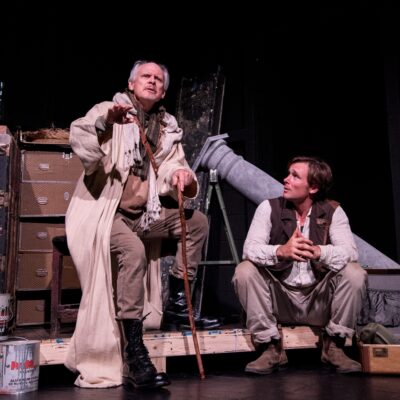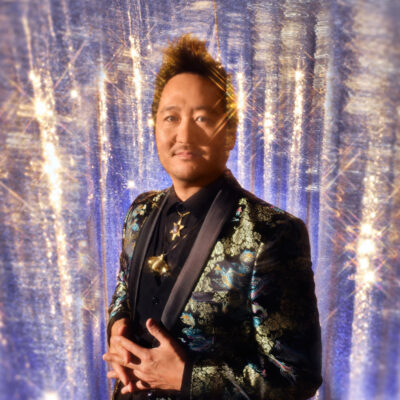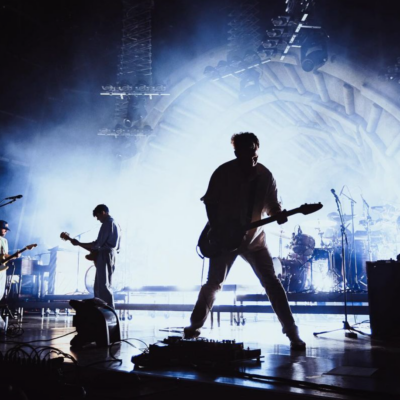
cd In their brief career, The Killers have always favored bold strokes. Their 2004 debut, Hot Fuss, was an oversized serving of glittery rock inspired by David Bowie and new wave. Frontman Brandon Flowers formed an early version of his band after seeing an Oasis show, and many of the band’s early moves seemed to come straight out of the Britpop playbook: starting petty rivalries with The Bravery and Fall Out Boy, dressing cool, writing simple, anthemic singalongs like “Mr. Brightside” and “All These Things That I’ve Done,” and, uh, befriending Elton John (who thanks the band for “inspiration” on his new CD).
But, true to Bowie’s example, the Las Vegas–born–and–bred Flowers has since undergone ch-ch-ch-ch-changes, reconnecting to the country of his birth. The real life Sam’s Town in the opening title track is a dumpy casino in Vegas, but the title also refers to the stern uncle with the beard and the top hat and, by extension, the rock mythology of 20th-century America. “I see London, I see Sam’s Town,” Flowers sings wearily at the song’s end, like a man happy to be taking a westbound Gulfstream out of Heathrow. He finds the place populated with grimy characters and their struggles, chasing dreams with the wind blowing against their faces.
But Brandon Flowers isn’t from Jersey, and, just as his voice is always buried in reverb and a vaguely telephonic timbre to connote ironic distance, his tales are cloaked in a gold lamé shroud that reflects his hometown’s effortless glitz and gift for constant change. Which is not to the songs’ detriment. There’s joy in this bombast, a catharsis in music that swings for the seats every time. We look to the Killers for thrills, not wisdom, and more often than not, Sam’s Town delivers. “For Reasons Unknown” builds from a single guitar’s chord into a towering edifice of yearning. “Why Do I Keep Counting?” evokes Queen in its bouncy music-hall piano interludes and closing line delivered in an echo chamber on loan from “Bohemian Rhapsody.” And bookending the album with the miniatures “Enterlude” and “Exitlude” creates a pleasing “concept album” arc.
Sam’s Town was produced by Alan Moulder and Flood, who worked together on U2’s 1997 Pop, among other albums—these guys know how to handle ambition. The record is not terribly different sonically from Hot Fuss, just grander and deeper: synths front and center, stacks of guitars sprinkled with a handful of glam-rock glitter, wobbly slap bass. Horns punch in on the second single “Bones,” but even in the radio-ready production they tend to bleed into the indistinct but powerful wall of sound. You won’t own a louder album.
And that’s appropriate, because Sam’s Town suggests a longing for the naive romanticism of epic classic rock and a deliberate step away from revisiting the icy remove of ’80s postpunk. For the Killers to pull off affecting such a wide-eyed outlook, given their carefully maintained image of underground cool (they have a song called “ Glamorous Indie Rock & Roll” for God’s sake) is particularly significant.
There are some speed bumps on the highway jammed with broken heroes. For all its catharsis, drama, and sweep, Sam’s Town lacks a sense of real obstacles. In every song, an escape to greener pastures is no farther away than an act of sheer will, and there’s little doubt that it’ll all work out. In this sense, Sam’s Town is essentially conservative, perhaps a reflection of Flowers’ Mormon upbringing in the shadow of America’s shrine to dreams fulfilled. There’s little sense of forces beyond one’s control, of flaws that might not be overcome by hitting the road. Everything is available on that open highway; Flowers obviously never noticed or cared that the dreamers in Springsteen’s “Jungleland” wound up “wounded, not even dead,” or gave a close reading to the rage of “Born in the U.S.A.”
Perhaps such misgivings don’t need to be countered. Cinemascope framing may be enough for a rock album that lifts, offers escape, begs to be turned up, and does you right when you need a boost. That a record of such optimistic utility comes from The Killers, who once seemed the hardest-working cynics in show business, says something about one of rock’s greatest virtues: its endless power for reinvention. It’s a quality shared by Flowers’ heroes, too, many of whom are now professed Killers fans: John, Bowie, and Morrissey are all icons given to theatrics, hailing from an era when ambition and rock weren’t natural enemies. The Killers, it seems, have come to that place where they really wanted to go, and they’re walking in the sun. The darkness on the edge of town can wait for another day.—Mark Richardson





